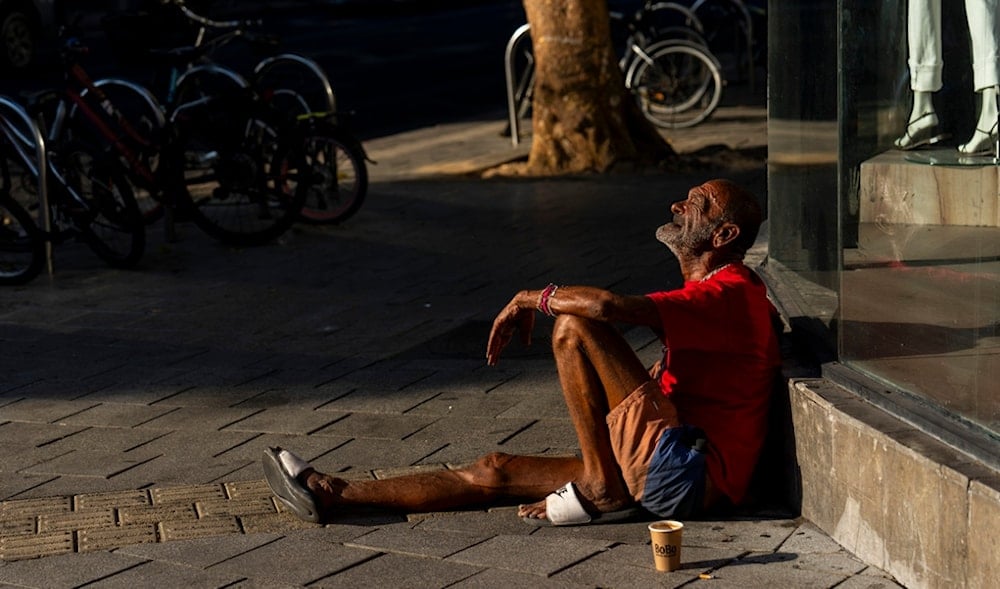War on Gaza shatters Israeli economy, risks spread of poverty
Economists warn that if the war on Gaza is further prolonged, "Israel" risks longer, harder, and much slower economic recovery.
-

An Israeli settler sits on the sidewalk next to a mall in Tel Aviv, occupied Palestine, Thursday, Aug. 15, 2024. (AP)
As the war on Gaza nears its one-year mark, the consequences have been particularly dire when it comes to Israeli economy, with the threat of poverty looming over settler communities far from the fighting.
The Israeli economy had already shown major signs of weakness before October 7, but the situation was exacerbated when Operation Al-Aqsa Flood and the subsequent genocidal war crashed the occupation.
During the fourth quarter of 2023, the Israeli GDP contracted by 21%. Despite making a 14% recovery in the first quarter of 2024, growth slowed and stood at 0.7% for the second quarter, prompting economists such as Jacques Bendelac to warn of possible recession if the war does not soon cease.
In this context, Fitch Ratings, a capital market company, forecasted in August that the Gaza war—now the longest since 1948—could potentially extend into 2025. Israeli economy also faces the threat of a mutli-front war as aggression on the northern front with Lebanon escalates.
Three major ratings agencies, including Fitch, downgraded Israeli debt, possibly indicating that "Israel" could not close off its obligations, although credit ratings still remained high.
Read more: One year into war on Gaza, 'Israel' grapples with upper echelon exodus
Growth-generating industries rapidly die out
"Israel's" primary growth sectors are technology and the arms industry, both of which were exempt from the risks of war to a certain extent. However, other key areas such as tourism, construction, and agriculture were dealt heavy blows and are "dying out one after the other", Bendelec said.
After October 7, "Israel" stopped issuing work permits for Palestinians, which constitute the majority of the labor force, resulting in significant labor shortages. Before the war, approximately 100,000 Palestinians were granted work permits in occupied territories, compared to the current 8,000, Kav LaOved, an Israeli labor rights organization, revealed.
In Tel Aviv, considered "Israel's" economic hub, construction has come to a halt, leaving skyscrapers and transport projects incomplete. Since October 7, tourism has also significantly declined, as the ongoing war has deterred holidaymakers and religious pilgrims.
From January to July, "Israel" received 500,000 tourists, just a quarter of the number compared to the same period last year, according to the Tourism Ministry.
'Israel's' war manifests poverty
According to Bendelac, over the past twenty years, "Israel" has relied heavily on credit consumption. However, settler families have been unable to pay off their debts and loans, particularly amid the current circumstances.
He warned that high living costs, combined with an economic slowdown, would "inevitably lead to an increase in poverty." Humanitarian organizations are already witnessing a rising demand for their services, with new individuals appearing in food distribution lines.
For example, in a shopping center parking lot in Rishon Lezion, the NGO Pitchon-Lev, or "Open Heart," provides free baskets of fruits, vegetables, and meat twice a week. Founder Eli Cohen stated that since the war began, the organization more than doubled its activities, and was now supporting nearly 200,000 families across occupied territories.
New beneficiaries include "young individuals, families with husbands serving as reservists, many former donors, and all those who were evacuated from northern settlements due to the ignition of the northern front.
Regarding recovery prospects, Bendelac noted that "there is typically a strong economic rebound" following the end of a war. However, he cautioned that "the longer this war continues, the slower and more challenging the recovery will be."
Read more: Israeli economy 'is a sinking ship': Israeli media

 4 Min Read
4 Min Read








